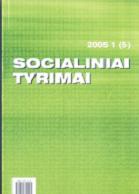Vadovavimas organizacijoje lytiškumo aspektu
Leading in Organization According to Sexuality Aspect
Author(s): Jonas Ruškus, Remigijus BubnysSubject(s): Social Sciences
Published by: VšĮ Šiaulių universiteto leidykla
Keywords: Leadership; leaders’ attitudes; peculiarities.
Summary/Abstract: In this final paper the singularities of leading accord-ing to sexuality aspect are being analyzed. It was seeking to answer to such problematical questions as: Do special stereotypes and professional hierarchy exist in contemporary leading according sexuality aspect? Is the difference be-tween makiavelistical-antimakiavelistical regulations fol-lowing? What kind of external factors (age, work experi-ence, position of leading, professional field of activity and etc.) explains the dynamics to leading organization accord-ing sexuality aspect? Subject of research is the chosen leading regulations of male and female and its stereotyped expression. Object of this final paper is to identify the expression of regulations of male and female leaders and the singularity of possible dif-ferences. There were hypothesized that is believable that the expression of leading styles according sexuality and the differences of singularities of possible stereotypes and regu-lations will be showed up. Also it is believable that hypo-thetical connection between traditional leading styles and dimensions of makiavelism really exists. The research was done in accordance with the method of survey. The scales of features, such as regulations of makiavelism, parts and stereotypes of sexuality, leading styles and individual attributes were used. 274 leaders, working in education, health, social services, public admini-stration and profit-making organizations (industry, trade, production, services) participated in this research. After the research and analysis of results we may point out such conclusions, that the expression of makiavel-ism peculiarities of male leaders is much stronger than fe-male leaders. Leader, which is working in the field of indus-try, production and services, having higher position and lower education, appeals to the conception of cynical human nature, personal benefit and manipulation when he is com-municating with his subordinates. Antimakevialistic atti-tudes were more characteristic to leaders, which were work-ing in the fields of education and science, also elder leaders. It was ascertained, that the traditional, stereotypical concep-tion of work sharing by sexuality was less characteristic for female leaders that for male leaders. The hypothesis was confirmed that the connection between makiavelism and traditional leading styles really exists. It was revealed that two dimensions can explain lead-ing in organization according to sexuality aspect condition-ally: particular doctrine for succeed choosing suitable means and the dimension of sexual equality, which reflects the position of professional hierarchy and sexual equality.
Journal: Socialiniai tyrimai
- Issue Year: 2005
- Issue No: 5
- Page Range: 52-60
- Page Count: 9
- Language: Lithuanian

